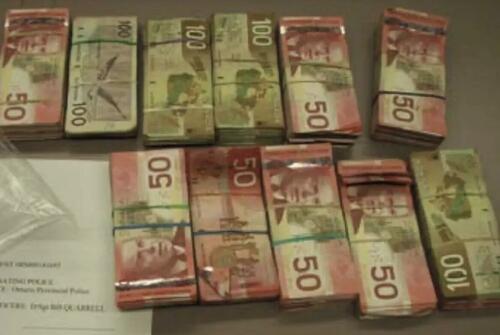In 2009, Thunder Bay police searched a rural Ontario home for an illegal .22-caliber handgun. They didn’t find the gun, but they did uncover cash hidden throughout the property: C$15,000 stuffed into a floor vent, C$9,750 tucked in a garage suitcase, and about C$1.2 million sealed in a Rubbermaid tub buried beneath the garage floor, according to the New York Times.
The tenant, Marcel Breton, was charged with possessing proceeds of crime, but he successfully challenged the search warrant and was acquitted. That left the courts to decide whether the money should be returned or forfeited—never a tough call for a government that treats unclaimed cash like its natural habitat.
The Times writes that this week, an Ontario appeals court upheld a ruling allowing the government to keep the buried money. Though Breton wasn’t convicted, prosecutors persuaded the court the cash wasn’t lawfully his. The judges emphasized the sheer scale and packaging of the money. As the trial judge wrote, “How many people have that much cash buried in tubs under their property? How many average people have that much money in their bank accounts at any given time? Not a lot in my experience.”
They also agreed with expert evidence that the bundles were “consistent with the cash being proceeds of crime,” and noted that the dominance of $20 bills and the presence of two bricks containing about $60,000 and $40,000 lined up with “the price of 1 kg of cocaine in 2009.”
Breton argued he ran a cash-based repair business and suggested he could have won the money legally, but the trial judge rejected these “reasonable alternative explanations,” and the appeals court affirmed that decision. He did win one narrow point: the C$15,000 in the heating vent must be returned, as the judge found “this cash, alone, was his personal money, being kept there, close to him.”
Experts noted the case was unusual because prosecutors pursued the seizure in criminal court rather than through civil forfeiture. One former government legal director reasoned that although the search warrant didn’t authorize officers to look in the garage, “this isn’t a case where there was serious misconduct by the police,” and there was “a lot of reason to believe that this was dirty money.”
Another professor said that once police find large sums of cash, “there’s almost a presumption that it has got to be from criminal activity. Period.” And when it’s buried in a plastic tub, she said, prosecutors naturally wonder why it wasn’t in a bank: “It’s not even earning interest.”
Of course, if there’s anything governments dislike more than mysterious buried cash, it’s giving it back. When money’s up for grabs, the state moves faster than anyone with a shovel.
Loading recommendations...
